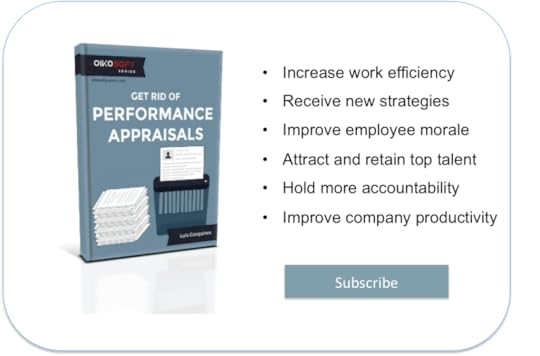Providing Feedback – Awesome excuse to impose Performance Appraisals
Hi guys, some of you that follows my work knows that I love to write about Performance Appraisals. Specially now at this time of the year where everyone in companies are talking about Performance Appraisals. Every time I talk with someone about abolishing performance appraisals from the face of earth, the “feedback excuse” is always on the top of the list, this meaning that Performance Appraisals cannot disappear because without them most of employees would not know how they are performing.
Well let me tell you something, it is not uncommon to employees to receive feedback from their bosses that does not match at all with the feedback that is provided by the people with whom employees work on a daily basis, if this would not be so sad I could actually laugh a bit with this. Now you are thinking that I am saying that we do not need to receive feedback :). No, I am saying that we need feedback but we should not wait for Performance Appraisals to receive this feedback.
“In any well-functioning organization, anyone ought to feel free to give anyone else feedback.” Peter Quarry
Tom Coens and Mary Jenkins on their book: “Abolishing Performance Appraisals”, make this statement: “The people of your organization will effectively use feedback when they recognize, understand, and genuinely value the importance of good communication and information sharing.” to achieve this there there are four topics that need to be implemented.
Create a Clear Vision of the Culture Your Organization Desires
Through awareness and education, foster a shared vision in which people see the importance of good communication and commit to sharing information. Help them understand that communication and feedback must become an integral part of the day-to-day work for everyone in the organization. This means adopting a common belief that it is everyone’s responsibility to continually share and seek out helpful information. Help people see that they will be truly empowered when each one of them, not the supervisor or organization, is responsible to seek the feedback each requires.
Enlighten, Educate, and Train People About Useful Feedback
Part of the task is to help people understand what feedback is, how communication really works, when feedback is most useful, and the value it brings. A key component is helping people understand that the receiver of feedback has at least as much responsibility, and probably more, than the giver of feedback. This requires education that expands people’s thinking about feedback, for example, teaching people ways to get and use feedback on processes and systems or how to get feedback from internal and external customers. The organization also must help people develop the basic skills around giving and receiving feedback.
Provide Structures That Encourage and Support Individual Feedback
Ideally, your organization should offer an array of feedback formats, tools, and processes, and offer related training to givers and receivers alike. For example, you could provide a list of prepared questions on forms and templates that are helpful in particular occupational areas. You can offer software that enables people to easily gather, track, and display feedback from work processes and systems. You also may wish to design an elective 360-degree feedback system as a developmental tool, offering employees the training and administrative resources to help them.
Raise Awareness and Use Non-Feedback Communication Tools
The practice of dialogue has justifiably garnered great attention in the business press, and, if it is properly conducted, yields powerful results. A tool called open space, most popularly crafted by Harrison Owen, has demonstrated incredible power to energize a small or gigantic group of people to commit to multiple improvement initiatives. Another tool, proven over four decades, is future search, which, in two or two and one-half days, a group of diverse stakeholders reflect on critical trends and devise guideposts for organizational strategic improvement.
As you can see from this article abolishing appraisals does not mean abolishing feedback. There are several things that you can and should do in order to create an environment that cultivates constant feedback every where.
“Ultimately, managers aren’t responsible for their people’s performance. People are responsible for their own performance. There’s feedback all around you—if you pay attention. If you’re not getting enough feedback, ask for it.” Anne Saunier
This blog post is part of my new book that you can find here. If you are interested in being a beta reader and provide me valuable feedback, please subscribe the newsletter below. I will keep you updated with the latest status and the first drafts of new chapters.
The post Providing Feedback – Awesome excuse to impose Performance Appraisals appeared first on Welcome to.




